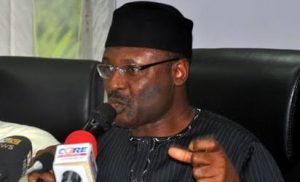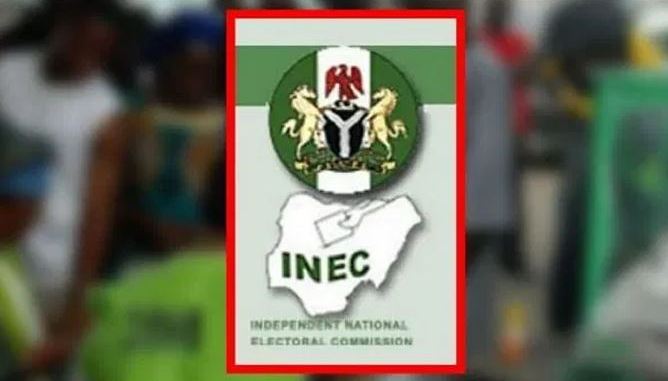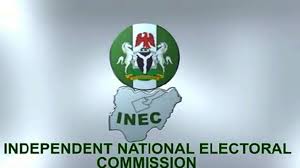Uncategorized
INEC seeks stakeholders collaboration in instituting electoral transparency
The Independent National Electoral Commission (INEC) has urged stakeholders in the electoral process to join the commission in deepening the use of technology and instituting a regime of transparency in electoral process.

INEC Chairman, Prof. Mahmood Yakubu, represented by Mr Festus Okoye, INEC National Commissioner and Chairman, Information and Voter Education Committee, made the call at a virtual workshop on reversed “INEC Communication Policy,” held on Friday.
Yakubu said the commission was fully aware that the old ways of doing things must gradually give way to the new by deepening the use of technology in the electoral process.
“This is the basis of the introduction of the INEC party nomination portal, the election observer accreditation portal and the media accreditation portal.
“Transparency in the result transmission process led to the development and deployment of the INEC Result Viewing Portal wherein the commission uploads Forms EC8A for public viewing.
“We at the commission will continue to deepen our knowledge of global trends in election management and communication.
“We will continue to enhance our knowledge of electoral issues and processes and we urge the media, civil society groups and indeed all relevant stakeholders to join the commission in deepening the use of technology in the electoral process.
“We urge critical stakeholders to join the commission in instituting a regime of transparency in election and result management and transparency. This desire to achieve these noble goals is at the heart of the development of this Communication Policy,” Yakubu said.
He described the INEC Communication Policy as a composite document designed to address both internal and external communication processes and procedures of the commission and for the commission.
Informing that it was designed to eliminate “ad-hocism” in the entire gamut of the Commission’s communication system, Yakubu implored all the participants to familiarise themselves with the clear intendment and intentions of the document.
He also told them to see it as a tool not only of understanding INEC communication policies but also of seeing the challenges.
He said that it was difficult communicating internally and externally when individuals and groups were facing existential challenges occasioned by a pandemic.
“It is difficult getting individuals, groups and organisations to focus on the conduct and management of elections in a period of fear, anxiety or worse.
“It is difficult getting individuals and groups to focus on elections when the dominant issues in global lexicon relates to a virus and protocols relating to managing it.
“It is difficult getting people to focus on elections and electoral matters when there is looming danger that they may be out of job or already out of work or are in Internally Displaced Persons Camps. It is difficult getting people to focus on elections in a period of uncertainty.”
Yakubu added that communicating what people may see as non-essential service in a period of a pandemic or uncertainty requires a new form of capacity and skill, which required new thinking and new methodologies and strategy.
” Consequently, information/ communication experts and managers must design ways and means of getting the people to focus on messages that are related to the electoral process.
“It is also important to disseminate such messages and information using means that the people can relate to in a new setting of physical distancing, lock down and daily rise in infection level.
“Information managers must therefore communicate in such a way that people will see and appreciate election as an essential service.”
The commission chairman added that Communication Policy was designed to enable INEC communicate effectively.
Yakubu sought the cooperation of all the critical stakeholders in INEC external communication drive, pledging that the commission, more than before needs the understanding, cooperation and reach of the media to get its messages across to the Nigerian people.
Presenting the overview of revised INEC Communication Policy, the Chief Press Secretary to INEC Chairman, Mr Rotimi Oyekanmi, said that the 55 pages document covered different areas that would enhance effective communications of the commission.
Oyekanmi said that the document emphasised that as much as possible, “only professionals or personnel that have received appropriate training should be put in charge of handling media relations and voter education programmes” of the commission at all levels.(NAN)
Uncategorized
JUST IN: Plane Crash Averted as PH-Bound Arik Aircraft Develops Engine Fault Mid-Air

Fabian
Passengers aboard an Arik Air flight from Lagos to Port Harcourt were thrown into moments of anxiety on Wednesday morning after the aircraft developed an engine problem mid-air, prompting an emergency diversion to Benin City.
The airline confirmed that the Boeing 737-700 aircraft, registered as 5N-MJF and operating Flight W3 740, was descending into Port Harcourt International Airport, Omagwa, when the crew heard a loud bang from the left engine.
In line with standard safety procedures, the pilots immediately diverted the flight to the nearest airport as a precautionary measure. The aircraft landed safely at Benin Airport without further incident.
Arik Air disclosed that all 80 passengers and crew members onboard disembarked safely, with no injuries reported. The airline also stated that alternative arrangements were made to transport the affected passengers to their final destination in Port Harcourt.
In a statement issued after the incident, the airline’s Public Relations and Communications Manager, Adebanji Ola, apologised for the disruption and reassured the public of its commitment to safety.
“The safety and wellbeing of passengers is always our priority at Arik Air. We sincerely apologise to the affected Port Harcourt passengers whose journey has been disrupted,” the statement read.
Uncategorized
Nationwide Blackout Looms as Electricity Workers Issue 21-Day Strike Notice to FG

Fabian
Electricity workers under the umbrella of the National Union of Electricity Employees (NUEE) have threatened to embark on a nationwide strike over unresolved labour issues in the power sector.
The union issued a 21-day strike notice to the Federal Government, citing widespread anti-labour practices, wage violations, non-remittance of statutory deductions, and growing job insecurity within the Nigerian Electricity Supply Industry (NESI).
In the notice dated January 26, 2026, and signed by NUEE’s Acting General Secretary, Igwebike Dominic, the union warned that failure to address the grievances within the stipulated period could lead to industrial action capable of crippling electricity generation and distribution across the country.
Dominic noted that many of the issues have lingered for over 12 years since the privatisation of the electricity sector, accusing the Ministry of Power of showing little interest in resolving them.
“We have written several letters to your highly exalted office on precarious work in NESI, especially in Gencos and Discos, since after the privatisation of the electricity sector for more than 12 years, but the Ministry seems not to be interested in the matter,” the letter stated.
The union accused power sector managements of refusing to negotiate and implement procedural agreements and conditions of service, particularly in generating companies. It also alleged failure to implement the 2025 National Minimum Wage Act and its consequential salary adjustments.
According to NUEE, workers’ constitutional rights to unionise and engage in collective bargaining are being suppressed, with union activities restricted within company premises. The union further alleged that employers deduct union dues and other statutory contributions but fail to remit them.
It also claimed that third-party deductions such as Pay As You Earn (PAYE) taxes and pension contributions have remained unpaid for extended periods. In some distribution companies, including Kaduna and Kano Discos, pension deductions were reportedly not remitted for as long as 82 months.
The union raised concerns about alleged harassment, intimidation, and threats against workers in some companies, including Ikeja Electric and Egbin Power Plc, describing what it called the “militarisation of the workplace.”
Despite repeated electricity tariff increases, band reclassifications, and improved revenues to power firms, NUEE said workers have seen no promotions, salary increments, or bonuses, while facing public backlash over poor power supply.
“Tariffs have gone up repeatedly, yet there has been no promotion, no increment, no bonuses, and no improvement in working conditions for workers, while customers vent their anger on innocent employees,” the union stated.
NUEE also accused investors of failing to meet post-privatisation commitments such as capital injection, metering expansion, network upgrades, and improved electricity supply, describing the situation as a failure of the privatisation process.
The union urged the Federal Government to urgently convene stakeholders to address the crisis, warning that if the issues are not resolved within 21 days, workers will resort to “legitimate labour actions” to protect their rights.
“We demand the immediate resolution of all these anti-labour issues within twenty-one days of the receipt of this letter. Otherwise, we will not be constrained to take our fate into our hands by employing any legitimate labour weapon suitable for the situation. This is not a threat,” the notice concluded.
Uncategorized
BREAKING: Explosion Rocks Bayelsa State Secretariat Complex

Fabian
An early morning explosion disrupted activities at the Bayelsa State Secretariat Complex in Yenagoa on Wednesday, triggering panic among workers and residents nearby.
The blast, which occurred around 6:00 a.m., was reportedly caused by a suspected Improvised Explosive Device (IED) planted within the secretariat premises. Security agencies swiftly responded, securing the area and restricting movement in and out of the complex while safety checks were conducted.
The Bayelsa State Police Command confirmed that no casualties were recorded and no buildings were damaged in the incident.
In a statement issued shortly after the explosion, the Commissioner of Police, CP Iyamah, said he personally led the Explosive Ordnance Disposal (EOD) Unit, Special Drone Unit, and other tactical teams to the scene.
“The Bayelsa State Police Command wishes to inform the general public of a suspected IED explosion which occurred today, 11th February 2026, at about 0600hrs within the State Secretariat Complex. I immediately led the Explosive Ordnance Disposal (EOD) Unit, Special Drone Unit, and other tactical teams to the scene,” he stated.
He added that operatives quickly secured the area and conducted a detailed search, during which an unexploded IED was discovered and safely neutralized. “No life was lost and no property was destroyed,” the Commissioner said.
A 60-year-old man, identified as Pentecost Elijah from Otuan Community in Southern Ijaw Local Government Area, was arrested at the scene in connection with the incident. He is currently being interrogated at the State Criminal Investigation Department and will be charged to court upon conclusion of investigations.
CP Iyamah assured residents that the situation was under control and normalcy had been restored, urging the public to remain calm and go about their lawful activities.
Following the incident, the Bayelsa State Government announced a temporary four-hour suspension of work at the secretariat as a precautionary measure. The directive, issued by the Head of Service, Dr. Wisdom Ebiye Sawyer, affected over 6,000 civil servants who were asked to stay away from the complex while security checks were completed.
Security operatives, including the anti-bomb squad, blocked major roads leading to the State Secretariat and Government House, while surveillance teams combed surrounding buildings to rule out further threats.
Authorities later confirmed that the area had been declared safe and normal activities were gradually resuming.
-

 Uncategorized5 years ago
Uncategorized5 years agoFG, states urged to harness flooding for ranching, others with technology – Agbaje
-

 Headlines10 years ago
Headlines10 years agoBreaking: EFCC seals Borno House of Assembly, as Hon members take to their heels
-

 News12 years ago
News12 years agoNigeria Security Operatives Stage Manhunt For Homosexual Perpetrator
-

 News9 years ago
News9 years agoHow 21-year-old Girl fled community over accusation of lesbianism
-

 News10 years ago
News10 years agoYobe Gov Moves Against Deputy
-

 Opinion7 years ago
Opinion7 years ago7 signs she has friend zoned you
-
Technology4 years ago
Online job placement company headhunts women
-

 Headlines10 years ago
Headlines10 years agoBorno Dep Gov Abducts Another Church Leader








